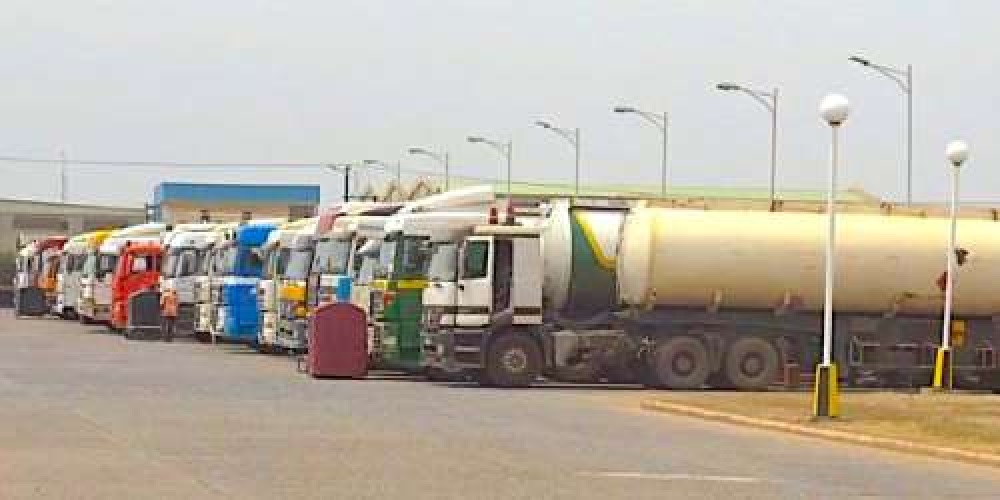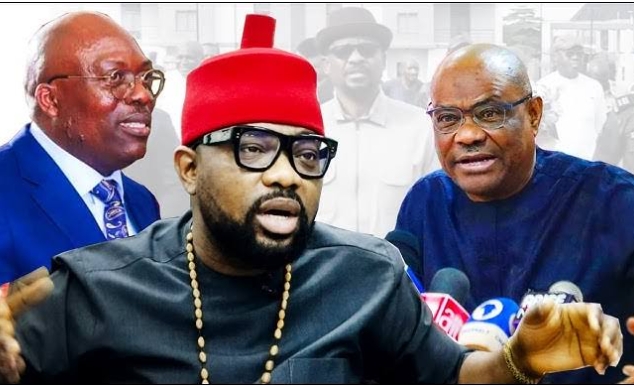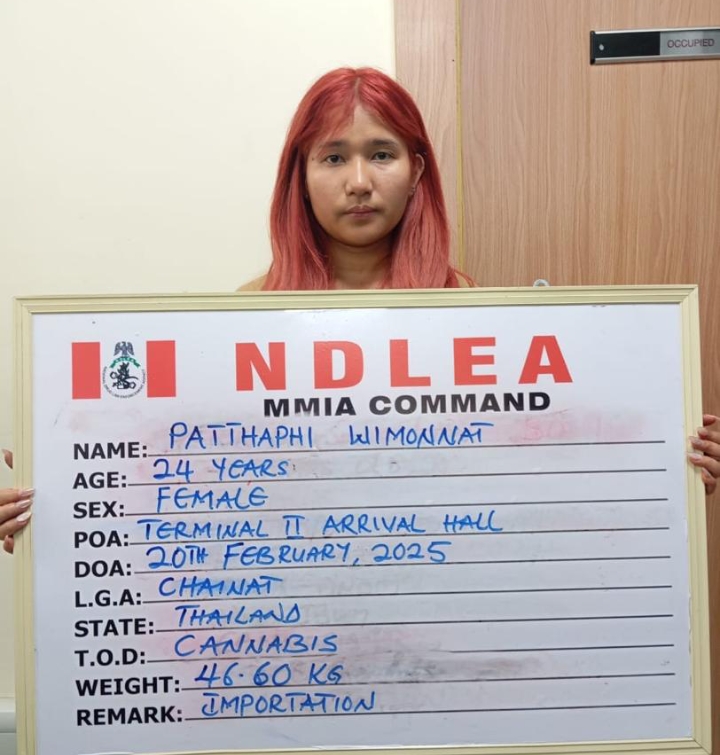News
FG’s Meeting With NARTO, Oil Marketers Ends In Deadlock

The strike action embarked by members of the Nigerian Association of Road Transport Owners, NARTO, has continued into the second following the failure of the Federal Government, oil marketers to reach agreement with the transporters.
A meeting conveyed by the Minister of State Petroleum Resources (Oil), Senator Heineken Lokpobiri with NARTO, oil marketers and the Nigerian Midstream and Downstream Petroleum Regulatory Authority, NMDPRA, in Abuja ended with an agreement.
Senator Lokpobiri told journalists that the meeting will continue as the government seeks to find a solution to issues raised by the transporters.
According to the Minister, “We have been having engagement with different stakeholders in the downstream petroleum industry based on some concerns which were raised. The engagements are still continuing and we hope that we will be able to find solutions to those concerns as soon as possible. Engagement will continue tonight till tomorrow.
“But it should be pointed out very clearly that they have demonstrated utmost good faith and patriotism. It should also be known that the issues have nothing to do with the government. It is basically commercial. But as a government we have decided to intervene so that Nigerians will not suffer unduly”, he added.
NARTO had threatened to stop the lifting of petrol over high cost of operation.
NARTO National President, Alhaji Yusuf Lawal Othman explained that the tanker owners have been recording huge losses due to high cost of operation which is no longer sustainable.
He explained that members would park their trucks from Monday “because what we spend on operation is more than what we get in total: both in local and bridging”.
He said: “We will have to suspend operations between now and Monday. We cannot continue to operate at a loss. Most people have parked. A lot more are going to park.
“But from the point of view of the association itself, we are going to suspend operations on Monday.”
Othman disclosed that NARTO’s efforts at soliciting the intervention of all the key stakeholders in the Federal Government and industry have not yielded positive results.
“We have written letters up to the level of the Chief of Staff. We have written to the Honourable Minister of State Petroleum Resources (Oil).
“We have written to DG SSS. We have written to the GCEO. We have written to the Authority Chief Executive. We have written to the Major Marketers, yet no response.”
He noted that the N32 Lagos to Abuja freight rate that was implemented while the dollar was N650 is still retained now that dollar is N1,615.
“Everybody is aware that all our consumables in terms of operation are not produced in the country. So, by virtue of the rate of dollars, every consumable has increased. But the freight they are paying us has been the same even during Buhari’s time.So how is that feasible?”
He explained further: “What I mean by local is if you load Lagos, you discharge in Lagos. And bridging is if you load from Lagos, you come to Abuja. Lagos to Lagos, we are paid N120,000.
“AGO alone to distribute fuel within Lagos is N140,000 because it is N1,400 per litre. So, they give you N120,000 and you spend N140,000. How do you want to operate? We are not talking about cost of vehicles, cost of loading, driver’s allowance. That is for local. For bridging Lagos to Abuja, they gave us N32.
“If you have a truck of 40,000 litres, you are talking of N1,280,000-N1,216,000. Less 5% of the amount of N1,280,000 Withholding Tax N64,000. Less 55,000 loading expenses and 15,000 driver allowance. Total expenses N134,000 while balance is N1,146,000. AGO is N1400 for 900 litres, totalling N1,260,000. There is a total loss of N114,000. The diesel that you use from Lagos to Abuja is 900 litres”, he added.
VANGUARD
News
REVEALED! Gov Fubara Accused of Paying N4.8Bn Monthly to Ikenga Ugochinyere

By Kayode Sanni-Arewa
The Governor of Rivers State, Siminalayi Fubara, has been accused of oiling his political alignment with the House of Representatives member, representing Ideato North Federal Constituency of Imo State, Ikenga Ugochinyere with N4.8 billion monthly.
The One Nigeria Movement (ONM), which made this allegation in a statement in Abuja on Saturday, said it could not longer keep silent in the face of gross and bare-faced use of money meant for the development of Rivers State to feed a single individual.
According to a statement by its Convener
General, Ahmed Sodiq-Mugoro and Secretary, Babatunde Aliyu, ONM, said, people of Rivers State must begin to hold the governor accountable and stop the looting being perpetrated, using the political crisis in the State as a cover.
The group alleged that each of the 23 Council Chairmen in the State are made to contribute N100 million monthly as “Political Development Fund” while N2.5 billion comes from Governor Fubara, making N4.8 billion.
This N4.8 billion is said to be meant for the Action Peoples Party (APP), under which the present Local Councils Chairmen and councilors contested the controversial Local Government elections.
Monthly, House of Representatives member, Ugochinyere, collects this sum of N4.8 billion on behalf of his party, APP.
It has therefore become important that the people of Rivers State begin to ask Ugochinyere what investment he made in the State that he is reaping N4.8 billion profit monthly.
News
Thai lady arrested at Lagos airport with boxes of illicit drug consignments As NDLEA intercepts UK-bound drug shipments concealed in walls of crated cartons

By Kayode Sanni-Arewa
Attempt by a 24-year-old Thai lady, Ms. Pattaphi Wimonnat, to smuggle 43 parcels of Canadian Loud, a synthetic strain of cannabis, weighing 46.60 kilograms into Nigeria through the Murtala Muhammed International Airport, MMIA, Ikeja Lagos has been thwarted by operatives of the National Drug Law Enforcement Agency, NDLEA, who arrested her after discovering the illicit consignment in her boxes.
The suspect who confessed to being a hired drug trafficker was arrested on Thursday 20th February 2025 during the inward clearance of passengers on Qatar Airways flight from Thailand via Doha, Qatar at the arrival hall, terminal 2 of the Lagos airport. She said the drug cartel, which recruited her promised to pay her $3,000 upon successful delivery of the illicit drug consignment in Nigeria.
Another bid by a drug trafficking syndicate to ship 68 parcels of Ghanaian Loud with a total weight of 42.2kg concealed in walls of crated cartons to London, UK, through the export shed of the Lagos airport was also frustrated by NDLEA officers on Friday 21st February. Three suspects: a freight agent and two dispatch riders were initially arrested in connection with the seizure before the mastermind of the shipment, Samuel Bitris, was swiftly traced to his Exodus Estate, Ajah, Lagos home where he was arrested.
At the Port Harcourt Port Complex, Onne, Rivers state, NDLEA officers on Thursday 20th February intercepted 49 cartons containing 49,000 pills of tamol, a brand of tramadol 225mg in a 40ft container during a joint examination of the shipment with men of Customs Service and other security agencies.
In Nasarawa state, NDLEA operatives on Saturday 22nd February arrested two suspects: Bello Adamu, 40, and Pius Azuka, 42 at Kokona/Keffi with 517kg of skunk, while two other suspects: Usman Ruwa, 43, and Yunusa Haruna, 45, were nabbed in a Toyota Corolla car conveying 62.7 kilograms of skunk along Sabon Asibiti road Kontagora, Niger state on Thursday 20th February.
With the same vigour, Commands and formations of the Agency across the country continued their War Against Drug Abuse, WADA, sensitization activities to schools, worship centres, work places and communities among others in the past week. These include: WADA sensitisation lecture to students and staff of Maku Grammar School, Tapa, Oyo state; Comprehensive Secondary School, Orogwe, Imo state; Jama’atu Islamiyya Secondary School, Ankpa, Kogi state; and Owerri-Aba Primary School, Ugwunagba, Imo state, among others.
While commending the officers and men of MMIA, PHPC, Niger, and Nasarwa Commands of the Agency for the arrests and seizures, Chairman/Chief Executive Officer of NDLEA, Brig. Gen. Mohamed Buba Marwa (Rtd) stated that their operational successes and those of their compatriots across the country especially their balanced approach to drug supply reduction and drug demand reduction efforts are well appreciated.
News
NSCDC, Tantita intensify joint efforts to combat oil theft in Niger Delta

The Nigeria Security and Civil Defence Corps (NSCDC) and Tantita Security Services Limited (TSSL) have intensified their joint efforts to eliminate economic sabotage in the Niger Delta, in line with the Renewed Hope Agenda set forth by President Bola Ahmed Tinubu.
As part of his inspection of NSCDC operations in the area, Commandant-General Dr. Abubakar Audi led a group of senior officers to meet with Chief Kestin Pondi, Managing Director of TSSL, and High Chief Government Ekpemupolo, commonly referred to as Tompolo, in Warri and Oporoza, Delta State.
Audi and his team also toured the operational facilities of NSCDC operatives working with Tantita in far-flung creeks of the Niger Delta and other formations to assess their activities and encourage the frontline security agents.
The Commandant-General while paying a courtesy visit to Pondi said his operational tour of the Niger Delta was to enable him get first hand information of his men on ground and strengthen the relationship between the corps and Tantita.
Audi said the NSCDC would celebrate the gallantry of his men on March 1st adding that the occasion would recognise fallen heroes of the corps and empower the families of deceased officers.
He said: “We place high premium on the welfare of our staff that is why every March 1st we recognise our personnel who died on active duty by assisting their families through payment of life insurance benefits and other empowerment schemes.”
In his remarks, the Managing Director, Tantita Security Services Ltd, Mr Kestin Pondi, heaped praises on President Ahmed Tinubu for providing the enabling environment to fight oil theft in the Niger Delta region.
He assured of closer collaboration with security forces including the NSCDC in the ongoing efforts to tackle pipeline vandalism and oil theft.
Pondi said without the collaborative efforts of the NSCDC and other security agencies, the success record would have been impossible.
He said prior to Tantita’s involvement in combating oil theft, production levels hovered around 800,000 barrels per day, adding that the increased production was because of the collaboration with NSCDC.
He said: “The success recorded in the recent past is not without the collaborative efforts of NSCDC. At the moment we have over 450 personnel in our organisation who have been providing collaborative services to our personnel.
“It is worthy of note that as at the time we came on board, the nation was producing between 600000 – 800000 barrels per day in 2022, but as at today we have gone over 2 million barrels per day and this is largely due to our collaboration with you.
A former President, Ijaw Youths Council (IYC) Worldwide, Engr. Udengs Eradiri, hailed NSCDC and Tantita for their mutual relationship saying their operational style was in line with President Tinubu’s leadership approach of community and stakeholders’ engagements.
Describing President Tinubu as a community man, Eradiri said Tinubu’s approach was centered around the people adding that in similar way Tantita and NSCDC approach instilled confidence in people to protect oil facilities within their domain.
“This is in line with President Tinubu’s leadership style. President Tinubu is a community man. His approach has always been about the people. For some of us who have known him for years ago, we are not surprised that he is doing things differently.
“Recall that when he was campaigning he came to the Gbaramatu Kingdom. President Tinubu expanded the relationship with Tantita and consolidated on what he met and that is why the trajectory has been smooth. President Tinubu is the reason Tantita is succeeding and we want to commend him for believing in Tompolo and the people,” he said.
-

 News24 hours ago
News24 hours agoSAD: Finally, Police recover remains of soldier k!lled over unpaid N20m ransom
-

 News23 hours ago
News23 hours agoSee Black Market Dollar To Naira Exchange Rate Today 22nd February 2025
-

 News23 hours ago
News23 hours agoGov Adeleke Votes As Osun’s LG Election Begins
-

 News23 hours ago
News23 hours agoNigeria Seeks Stronger Economic Ties with China
-

 News23 hours ago
News23 hours agoLP Withdraws from Osun LG Election Over Security Issues
-

 News23 hours ago
News23 hours agoPainful! Former NBC DG ,Prof Tom Adaba is dead
-

 News16 hours ago
News16 hours agoJust in : Senator Gumau is dead
-

 News17 hours ago
News17 hours ago10th NASS Committed to Constitutional Reforms – Kalu







